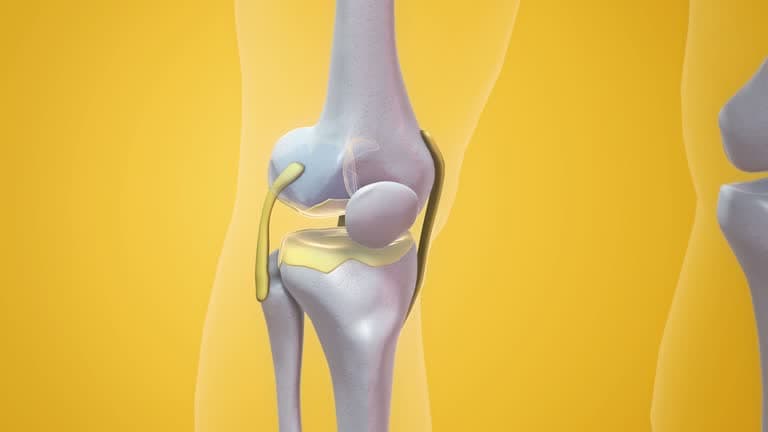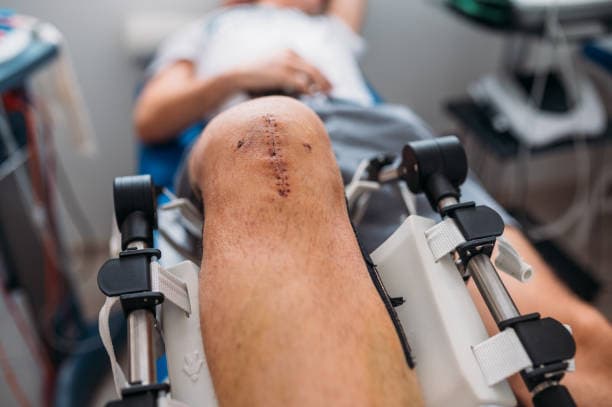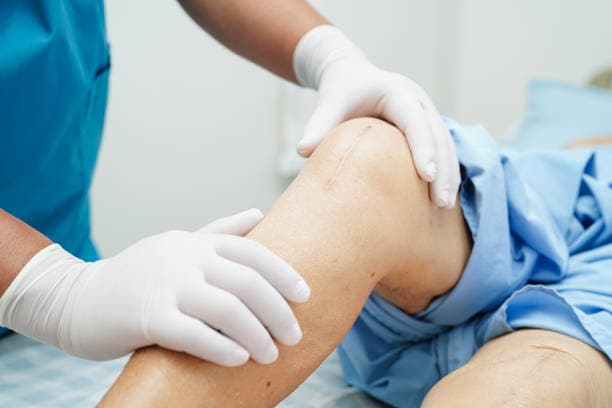If you're experiencing persistent knee pain or discomfort, it might be time to consider a knee replacement. This procedure can help alleviate pain and restore mobility, especially if other treatments have not been effective.
Signs you need a knee replacement
Persistent and debilitating knee pain that affects your quality of life can be a clear sign that you may need a knee replacement. If you experience severe pain that doesn't improve with medications, physical therapy, or other treatments, and if this pain interferes with daily activities like walking, climbing stairs, or even resting, it might be time to consider surgery. Limited mobility, stiffness, and swelling that don’t respond to conservative treatments can also indicate the need for a knee replacement. Additionally, if you notice a decrease in your knee's range of motion or if your knee frequently gives way or feels unstable, these could be further signs that a knee replacement might be necessary. Consulting with an orthopedic specialist can help determine the best course of action based on your symptoms and overall health.
Constant pain
Constant knee pain that persists despite various treatments and significantly affects your quality of life is a key indicator that you might need a knee replacement. This type of pain can be so severe that it interrupts daily activities such as walking, climbing stairs, or even resting. If you find that medications, physical therapy, or injections provide little to no relief, and the pain remains consistent or worsens, it suggests that the underlying issue might be advanced joint damage. This damage often results from conditions like osteoarthritis, rheumatoid arthritis, or traumatic injury. The constant pain not only limits mobility but also impacts your ability to enjoy life and maintain independence.

Swelling and inflammation
Persistent swelling and inflammation in the knee that do not subside with conventional treatments may be a sign that you need a knee replacement. Chronic inflammation often indicates ongoing joint damage, which can result from conditions like osteoarthritis or rheumatoid arthritis. This inflammation can cause significant pain, stiffness, and a noticeable reduction in your knee's range of motion, severely impacting your ability to perform everyday activities. If anti-inflammatory medications, physical therapy, and other conservative treatments fail to alleviate these symptoms, it may suggest that the underlying issue is severe and requires surgical intervention. Knee replacement surgery can address the damaged joint, reduce inflammation, and restore function, helping you regain mobility and improve your quality of life.
Stiffness in the knee and immobility
Stiffness in the knee and immobility that persist despite conservative treatments are significant indicators that you might need a knee replacement. Chronic stiffness can severely restrict your range of motion, making it difficult to perform everyday activities such as walking, standing, or bending your knee. This limitation often results from advanced arthritis or significant joint damage, where the cartilage has worn down, causing the bones to rub against each other. If physical therapy, medications, and other non-surgical treatments fail to improve the stiffness and you find that your mobility continues to deteriorate, it may be time to consider knee replacement surgery. This procedure can relieve pain, restore function, and significantly improve your quality of life, allowing you to return to a more active and comfortable lifestyle.

Bowing of the leg
Bowing of the leg, or the appearance of your leg curving inward or outward, can be a strong indicator that you may need a knee replacement. This condition often results from severe wear and tear on the knee joint due to advanced arthritis, where the cartilage that cushions the bones has significantly degraded. This degradation leads to bone-on-bone contact, causing the leg to bow as the joint becomes misaligned. The bowing not only alters the leg's appearance but also affects your overall gait and posture, leading to further discomfort and pain. If conservative treatments like bracing, physical therapy, or medications fail to correct the misalignment or alleviate the pain, knee replacement surgery may be necessary to restore proper joint function and alignment. By addressing the root cause of the bowing, knee replacement can help you regain mobility, reduce pain, and improve your quality of life.
Difficulty carrying out everyday activities
Difficulty carrying out everyday activities, such as walking, climbing stairs, or even standing up from a seated position, can be a strong indication that you might need a knee replacement. When the knee joint is severely damaged due to conditions like osteoarthritis, rheumatoid arthritis, or previous injuries, it can cause significant pain and stiffness that interfere with routine tasks. If you find that basic activities become increasingly challenging and non-surgical treatments such as medications, physical therapy, or assistive devices no longer provide relief, it may be time to consider knee replacement surgery. This procedure can help alleviate the pain, restore mobility, and enable you to perform daily activities with ease, improving your overall quality of life.

Disrupted sleep
Disrupted sleep due to persistent knee pain is a significant sign that you might need a knee replacement. When knee pain becomes so severe that it interferes with your ability to rest, it indicates that the joint damage is substantial and affecting your overall quality of life. Conditions such as osteoarthritis or rheumatoid arthritis can cause continuous discomfort, swelling, and inflammation, making it difficult to find a comfortable sleeping position. This lack of restful sleep can lead to fatigue, irritability, and decreased ability to cope with daily activities. If you find that pain relief measures like medications, physical therapy, or lifestyle changes are no longer effective in managing your symptoms and improving your sleep, it might be time to consider knee replacement surgery. This procedure can alleviate the pain, restore joint function, and improve your ability to sleep comfortably, contributing to better overall health and well-being.
Changes to your knee’s appearance
Noticeable changes in the appearance of your knee can be a significant indicator that you might need a knee replacement. These changes can include visible deformities, such as bowing or a pronounced inward or outward curve, swelling that doesn't subside, or a misshapen knee due to joint damage or bone deterioration. These physical alterations often result from conditions like advanced arthritis or severe joint degeneration, where the cartilage that cushions the joint has worn away, leading to bone-on-bone contact and causing the knee to change shape. If these changes in appearance are accompanied by persistent pain, stiffness, and reduced mobility, and if conservative treatments like medications or physical therapy no longer provide relief, it may be time to consider knee replacement surgery. This procedure can help restore the knee's function and appearance, alleviate pain, and improve your overall quality of life.

Nonsurgical treatments are no longer effective
When nonsurgical treatments such as medications, physical therapy, or lifestyle modifications no longer effectively manage your knee pain and other symptoms, it may be a sign that you need a knee replacement. Persistent pain, swelling, and stiffness that do not improve with these conservative measures indicate that the underlying joint damage is severe and that the knee is no longer responding to less invasive treatments. This scenario is common in cases of advanced osteoarthritis or other degenerative joint conditions where the cartilage has worn away, leading to bone-on-bone contact and significant discomfort. If you're finding it increasingly difficult to carry out daily activities and maintain your quality of life despite trying various nonsurgical options, consulting with an orthopedic specialist can help determine if knee replacement surgery is the appropriate next step. This procedure can alleviate pain, restore function, and improve your overall well-being, allowing you to return to a more active and fulfilling lifestyle.
You’re of a certain age
As we age, the likelihood of experiencing joint issues, including severe knee pain and dysfunction, increases due to the natural wear and tear on our bodies over time. For many, the cartilage in the knee gradually wears away, leading to conditions like osteoarthritis, which can cause significant pain, stiffness, and reduced mobility. If you're older and find that your knee pain is progressively worsening and not responding to conservative treatments such as medications, physical therapy, or lifestyle changes, it might be time to consider a knee replacement. The procedure can provide substantial relief from pain, improve joint function, and enhance your overall quality of life, allowing you to maintain an active and independent lifestyle. Consulting with an orthopedic specialist can help determine if knee replacement surgery is the best option for addressing your age-related knee issues.

Conclusion
In conclusion, recognizing the signs that you may need a knee replacement is crucial for maintaining your quality of life and mobility. Persistent and severe knee pain, swelling, and stiffness that do not respond to nonsurgical treatments, such as medications or physical therapy, are significant indicators. Changes in the knee's appearance, such as bowing, and difficulties carrying out everyday activities further highlight the need for surgical intervention. Additionally, disrupted sleep due to constant pain and the natural wear and tear associated with aging can also signal the necessity for a knee replacement. Consulting with an orthopedic specialist can help determine the best course of action based on your specific symptoms and overall health, ensuring you receive the appropriate treatment to restore function and alleviate pain.
Read More